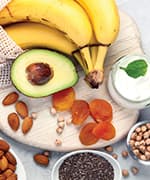LIFE EXTENSION MAGAZINE
Grape Powder Could Extend Lifespan by 4-5 Years
In a study the authors called “remarkable,” researchers found that giving grape powder to mice reduced the risk of non-alcoholic fatty liver disease and extended lifespan.
To see if grape powder could modulate the harmful effects of a high-fat diet, researchers fed mice a typical Western (high-fat) diet. Half then received 5% standardized grape powder while the other half didn’t.
Compared to mice not fed the grape powder, the mice given grape powder saw beneficial increases in antioxidant genes, reductions in fatty liver, and extended lifespans.
The lead author estimated that when translated to humans, the extended lifespan would correspond to an additional 4-5 years in the life of a human.
The grape powder used in this study was composed of fresh red, green and black grapes that were freeze-dried to retain their bioactive compounds.
Editor’s Note: The researchers concluded: “These results suggest the potential of dietary grapes to modulate hepatic gene expression, prevent oxidative damage, induce fatty acid metabolism, ameliorate NAFLD (non-alcoholic fatty liver disease), and increase longevity when co-administered with a high-fat diet.”
Foods 2022, 11(13), 1984.
Greater Potassium Intake May Lower Blood Pressure in Women with High-Sodium Diets
A study published in the European Heart Journal found a link between consuming a greater amount of potassium and lower blood pressure among women with a high intake of sodium.*
The participants were 11,267 men and 13,696 women enrolled in England’s EPIC-Norfolk study. Sodium and potassium intake were estimated from urinary levels of these minerals.
Increased potassium intake was associated with declining blood pressure among women with high sodium intake. Each 1 gram increase in potassium consumption was associated with a 2.4 mmHg decrease in systolic blood pressure.
Editor’s Note: “…in view of various studies showing that women are more sodium-sensitive—i.e., having a larger change in blood pressure in response to changes in sodium consumption—women with high sodium intake might specifically benefit more from an increase in potassium intake,” the authors stated.
* Eur Heart J. 2022 Aug 7;43(30):2867-2875.
Taurine Supplementation Benefits Diabetes Patients
People with diabetes who received taurine supplements experienced improvements in glucose and other factors, according to the results of a review and meta-analysis of clinical trials, published in Food Chemistry: Molecular Sciences.*
Researchers analyzed five controlled trials including 209 participants, that evaluated the effects of taurine on individuals with type I or type II diabetes. Taurine doses ranged from 500 mg daily to 1,000 mg three times per day.
Participants who received taurine had lower fasting blood glucose, hemoglobin A1c (HbA1c, a marker of long-term glucose control), and insulin resistance, compared to those given a placebo.
Editor’s Note: “Taurine emerges as a new option for the management of patients with diabetes,” the scientists asserted.
* Food Chem (Oxf). 2022 Jul 30;4:100106.
Vitamin D Deficiency Linked to Breast Cancer
Most women with breast cancer were found to be deficient in vitamin D, according to the results of a study published in the journal Progress in Nutrition.*
Researchers analyzed the vitamin D status of 561 women, average age 55, with non-metastatic breast cancer.
In this group, 81% of the women were deficient in vitamin D, and 11% had insufficient levels of the vitamin.
Median 25-hydroxyvitamin D blood levels were only 13.91 ng/mL in this group of Turkish women.
Optimal ranges by U.S. standards are 30-80 ng/mL. Life Extension’s minimal target for 25-hydroxyvitamin D is around 50 ng/mL.
A significant portion of the world’s population where supplementation is uncommon and sun exposure limited have very low blood levels of vitamin D.
Editor’s Note: The researchers concluded that vitamin D levels should be measured in breast cancer patients and low levels should be corrected whenever diagnosed.
*Available at: https://www.mattioli1885journals.com/index.php/progressinnutrition/article/view/10428.
Clinical Trial Will Evaluate Form of Vitamin B1 in Alzheimer’s Treatment
The Alzheimer’s Disease Cooperative Study at the University of California San Diego (ADCS), in collaboration with Burke Neurological Institute, and Columbia University Irving Medical Center, plans to evaluate the effect of a high-dose form of thiamin (vitamin B1) known as benfotiamine in individuals with Alzheimer’s disease, the ADCS announced.*
“The trial addresses tissue deficiency of thiamine-regulated metabolic pathways linked to Alzheimer’s,” the announcement stated.
Approximately 400 participants with mild Alzheimer’s disease or mild cognitive impairment due to the disease will be enrolled at up to 50 U.S. clinical trial sites and will be evaluated during an 18-month period.
Editor’s Note: A $45 million grant from the National Institutes of Health and National Institute on Aging is supporting this clinical trial, which is slated to begin in early 2023.
*Available at: https://ucsdnews.ucsd.edu/pressrelease/novel-treatment-approach-to-alzheimers-disease-uses-vitamin-b1-derivative Accessed September 21, 2022.






